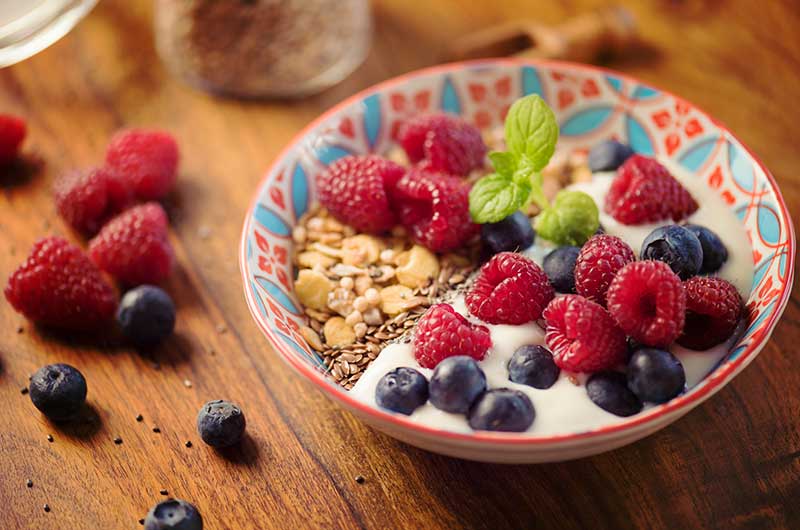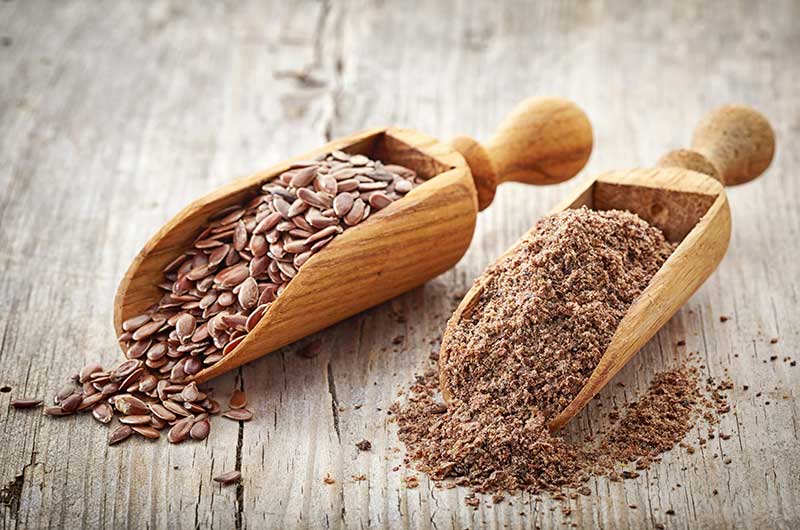
As registered dietitian nutritionists, we are constantly asked about which foods should be a part of a healthy, clean diet. Numerous foods make the grade, each with its own set of nutrient benefits. Plus, it is variety that ensures that you get a wide range of vitamins, minerals and health-promoting antioxidants and phytochemicals. Some foods, like dairy, pulses, nuts and seeds, are what we would call “triple threats,” as they contain a mix of protein, carbohydrates and fats, making them well balanced from a macronutrient standpoint. Of these, flax seeds are at the top of the list.
Flax seeds, also known as common flax or linseeds, date back to the Babylonian Empire and were brought to North America in the early 1600s. More than half of the fat in flax seeds is the essential fatty acid alpha-Linolenic Acid (ALA), which is a vegan source of anti-inflammatory omega-3s and the precursor to eicosapentaenoic acid (EPA). Flax seeds are also rich in lignans, which have been shown to help reduce the risk of breast cancer.
Nutrition Facts
Whole flax seeds contain 55 calories per tablespoon, while the same amount of ground flax contains 37 calories. Flax seeds are a good choice for those following a low-carbohydrate diet, as they are 29% carbs, 18% protein and 42% fat. The fiber content is composed of both soluble (20-40%) and insoluble (60-80%) fiber. Soluble fiber helps to regulate blood sugar and cholesterol levels, which can reduce the risk of type 2 diabetes and heart disease, and be used as a treatment for those conditions. When ground flax is mixed with water, the mucilage gums in the soluble fiber form a gel-like substance, which can help with satiety and promote weight loss, as well as improve bowel function.
How to Use Flax Seeds

Flax seeds must be ground before consuming in order to absorb its nutrients. The outer shell of the whole flax seed it so hard that it won’t break open during digestion, so it passes through you intact. Although ground flax seed is the preferred form of flax to consume, it is recommended that you buy whole flax seed and grind it in a coffee or spice grinder as needed. Because ground flax seed oxidizes quickly, it will turn rancid, which makes the ground flax meal sitting on the supermarket shelf a poor choice. For this reason, you should always refrigerate your whole and ground flaxseed. Flax seed can be added to smoothies, pancake, waffle and muffin batters, oatmeal and yogurt, and it makes a great binder for meatballs and meatloaf. Ground flax seed mixed with water also acts as an egg replacer in baked goods, which is a good substitute for those who have an egg allergy.
Health Benefits of Flax Seeds
- Anti-inflammatory: The omega-3 fatty acids in flax seeds are used to make prostaglandins, which are anti-inflammatory hormone compounds. They can be effective in reducing inflammation associated with arthritis, high blood pressure and autoimmune conditions.
- Heart health: Both the omega-3 fatty acids and the fiber in flax seeds act to lower heart-disease risk by reducing LDL (“bad” cholesterol), blood pressure and oxidative stress and inflammation in the arteries. Blood pressure can be significantly reduced with daily intake of ground flax seeds, which will, in turn, decrease risk of stroke and heart disease. If you take medications for high blood pressure, make sure to monitor blood pressure as a significant drop in blood pressure can occur and your doctor might want to reduce the amount of medication you take.
- Cancer: Flax seeds are rich in lignans (insoluble fiber) which function as phytoestrogens, plant compounds that are similar to estrogen and actually compete with estrogen for binding on receptor sites on cells. The more phytoestrogens compete with estrogen, the lower the risk of hormone-sensitive cancers such as breast, uterine and prostate cancers.
- Diabetes: As mentioned earlier, the soluble fiber in flax seeds can reduce fasting blood sugar levels, which can help manage as well as prevent the development of diabetes. One to two tablespoons of ground flax per day can be safely consumed. If you currently monitor your blood sugar level, continue doing so and note any changes that may occur with the addition of flax.
- Digestive health: Ground flax seeds can help prevent both diarrhea and constipation due to actions of the soluble and insoluble fiber. Flax is an excellent source of food for the bacteria in your colon, creating a healthier microbiome, which has been associated with weight loss, improved brain health and overall decreases systemic inflammation.
- Weight loss: The thick mixture that results from mixing ground flax seeds with water or other liquid can be effective at suppressing appetite and cravings, which can promote weight loss.
Adverse Effects and Concerns
Flax seeds are usually well tolerated by the body and allergy is rare. Be sure to drink plenty of water when consuming flax, so that they don’t thicken up too much and create a feeling of being “stuck.” Also, high amounts of flax seeds (5 tablespoons) can impair function of the thyroid gland, especially in individuals with thyroid problems. One to two tablespoons a day should not be problematic.
Some digestive problems, including gas, bloating, abdominal pain and nausea, have been reported by people who are not used to eating a lot of fiber and incorporate too much flax seed too quickly. We recommend starting with small doses (1/2 tablespoon) and gradually working your way to one to two tablespoons per day. Adding flax seeds may also increase bowel movement frequency.
The Bottom Line
Flax seeds have become very popular because of their high fiber and omega-3 content, which have been shown to have a myriad health benefits. Consuming one to two tablespoons of ground flax seed daily is recommended for overall health and wellness.
 by
by 









 by
by